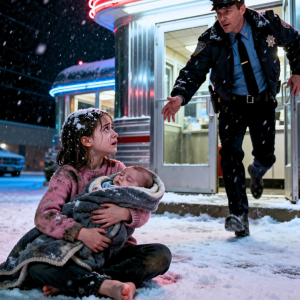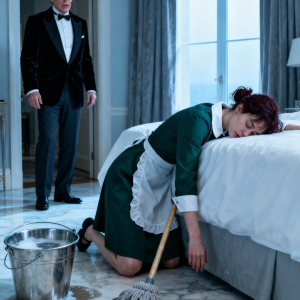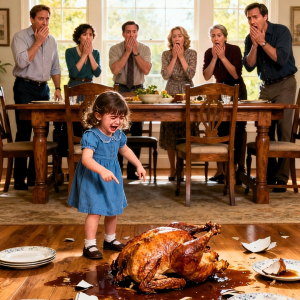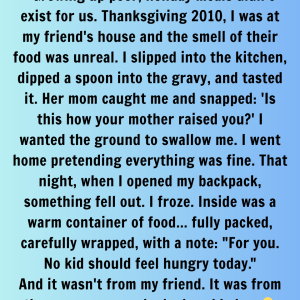
They say money cleans your past, sharp suits erase memories, and success makes you untouchable. They lied. My name is Alexander Marsh, CEO of Marsh Global Logistics, owner of a fleet of thirty-four armored trucks, a skyline apartment, and a reputation built on ruthlessness and control. But no amount of money prepared me for what I saw last Tuesday.
Detroit’s winter was merciless—wind slicing through the air like broken glass. I had just left a meeting, driving my steel-gray G-Wagon through the old neighborhood I once called home—a place I swore I’d never return to. As I slowed near 7 Mile Avenue, I saw something that made the breath freeze in my throat.
A little girl. No more than nine. Limping across the icy road, dragging something wrapped in a blanket behind her. Her left leg—snapped in half, forced into a filthy plaster cast—was trembling with every step. No crutches. No support. Just raw, unbearable pain.
Behind her, a baby boy lay motionless on a flattened cardboard box being pulled by a string. His tiny fingers were pale blue.
I stepped out of my car, my polished shoes sinking into the slush.
“Hey!” I called.
She flinched like I’d struck her. She rushed toward the baby, shielding him with her body.
“We didn’t steal anything!” she cried. “Please don’t take him!”

I raised my hands. “I’m not a cop,” I said gently. “I want to help.”
She was shivering violently, her lips cracked. “She’s coming,” she whispered. “Please. Don’t let her take him.”
“Who?”
“My stepmother,” she rasped. “She said if Leo cried again, she’d leave him outside. But he was hungry. So I took him. I had to.”
Hungry.
My stomach twisted.
“What did you give him to eat?” I asked.
Her voice broke.
“Toothpaste.”
Just then, a woman stumbled out of the alley, her robe stained, eyes wild, clutching a wooden hairbrush like a weapon.
“You ungrateful rat!” she screamed, rushing toward us. “I told you to stay in that house!”
The girl curled around her brother, shaking.
I stepped in front of them.
The woman paused. Her eyes flicked up at me—my coat, my height, my anger. She froze.
“You touch them,” I growled, “and you’ll regret it.”
She snarled. “That’s my baby! You can’t just take them!”
I reached into my wallet and shoved a thick wad of cash into her hand.
“For the inconvenience,” I said coldly. “Now walk away.”
Her eyes softened with greed. She backed off.
I grabbed the baby—light as a bundle of sticks—and carried him to the G-Wagon. The girl climbed in, her cast dragging behind.
Inside, the heaters hummed. She looked at me like she’d never seen warmth before.
“Are you… are you real?” she asked quietly.
“No,” I whispered. “I’m just someone who should’ve come sooner.”
I took them to the hospital.
Leo was severely malnourished. He didn’t cry—he couldn’t. His body didn’t have the strength.
But it was her leg that broke me.
The doctors removed the cracked cast.
Underneath—someone had written words in black marker.
PLEASE HELP US. DON’T LET HIM DIE.
Not just once. Dozens of times. Layer after layer.
She had been writing on her own cast, begging anyone who might notice.
And nobody did.
Not until now.
Tears blurred my sight. I turned away, but I heard her voice.
“I wrote it every week,” she whispered. “I thought maybe… one day… someone would see.”
I felt something snap inside me. Not anger. Not sadness.
Guilt.
Because I wasn’t just someone who could have seen.
I should have seen.
I grew up three blocks from that alley. I knew those winters. Those houses. That hunger.
I escaped.
But she couldn’t.
Not yet.
So I made a choice.
I became her legal guardian.
Six months later, Leo began to smile. Real smiles. The kind that reach the eyes.
And his sister—her name is Harper—told me something I will never forget.
“You didn’t save me,” she said.
“You just finally showed up.”
And quietly, painfully, beautifully…
I realized she was right.
Because saving someone isn’t always about giving them your money.
Sometimes…
It’s about giving them your presence.
Your fight.
Your voice.
And never letting them be unseen again.




